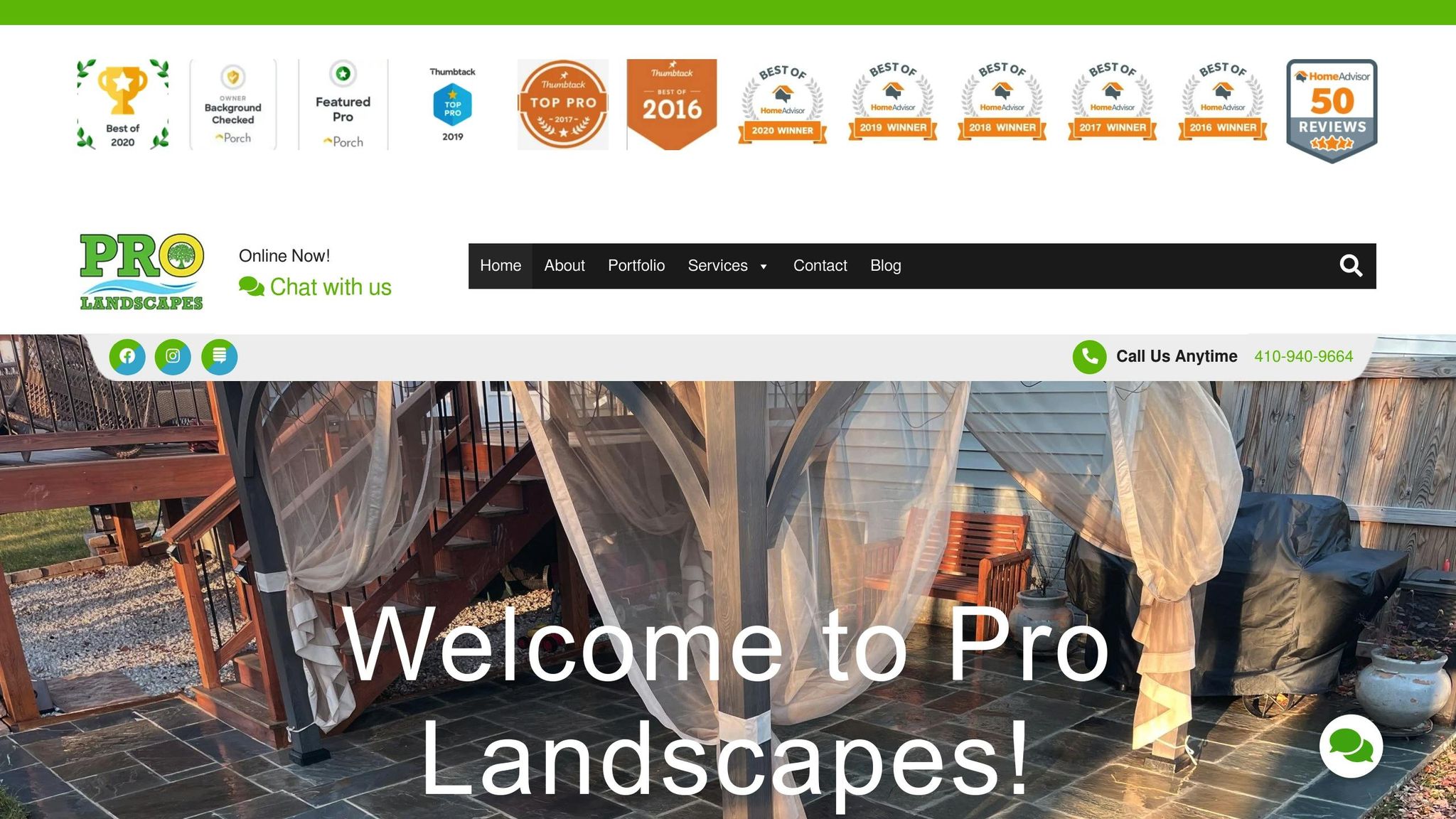- bhavya gada
- No Comments
Eco-friendly pavers are an excellent way to create beautiful patios while reducing environmental impact. Maryland homeowners are increasingly choosing these materials for their ability to manage stormwater, reduce carbon footprints, and support local ecosystems. Here’s a quick look at four popular options:
- Recycled Concrete Pavers: Made from crushed concrete and asphalt, these pavers reduce landfill waste and cut CO₂ emissions by up to 90%.
- Permeable Pavers: Designed with gaps or porous materials, they allow water to filter through, helping to prevent flooding and replenish groundwater.
- Reclaimed Brick Pavers: Salvaged from old buildings, these bricks offer a timeless look while conserving resources and cutting production emissions.
- Natural Stone Pavers: Locally sourced stone requires minimal processing, lasts for decades, and offers unique patterns and textures.
Each option balances durability, style, and eco-consciousness. Professional installation ensures proper drainage, stability, and compliance with Maryland’s regulations. Pro Landscapes MD specializes in creating patios tailored to these principles, combining functionality with sustainable practices.
Paver Essentials: Traditional & Permeable Pavers
Recycled Concrete Pavers
Recycled concrete pavers are a smart choice for creating patios in Maryland with an eco-friendly twist. These pavers are crafted from crushed asphalt and concrete debris, which are carefully screened, cleaned, and repurposed into new materials. The source? Old roads, sidewalks, and demolished structures, which are broken down into a granular form known as recycled concrete aggregate (RCA) [5]. Through screening, impurities are removed, and the material is sorted by size to ensure quality. RCA can then be used as a subbase or mixed into fresh concrete to produce new pavers [5]. This entire process not only supports greener construction practices but also offers practical environmental advantages.
The demand for these materials is on the rise. In 2023, the recycled concrete aggregate market was valued at over $9 billion, with projections pointing to an 8% annual growth rate through 2033 [5].
Benefits of Recycled Concrete Pavers
Recycled concrete pavers bring a host of environmental benefits to Maryland patios. Compared to traditional concrete production, these pavers slash energy use by 85% and cut CO₂ emissions by an impressive 90%. Modern processing techniques also enhance their performance, boosting compressive strength by 42% and reducing water absorption by 27% [7].
"By choosing pavers with recycled content, we are supporting eco-friendly practices that conserve resources and reduce landfill waste." [3] – Old Town Pavers LLC
Despite a slight dip in compressive strength, rigorous processing and quality checks ensure these pavers meet residential standards [5]. On top of their eco-conscious appeal, they also offer a variety of design possibilities.
Design and Style Options
Innovative manufacturers like Aspire Pavers take sustainability a step further by incorporating up to 95% post-consumer recycled materials, including tire rubber and plastics [6]. This approach uses 95% less energy, cuts CO₂ emissions by 96%, and eliminates the need for water in production. These pavers not only help the environment but also bring unique style options to the table.
Permeable Pavers
Permeable pavers are a practical way for Maryland homeowners to manage stormwater while adding a stylish touch to patios. These pavers are designed with gaps or made from porous materials, allowing water to seep through and soak into the ground, mimicking nature’s own filtration system [8].
These systems are highly effective. They can cut runoff by up to 90%, reduce total suspended solids by 47%, and lower E. coli levels in water by 69% [10]. Depending on factors like material, soil type, and rainfall, permeable pavers can absorb as much as 70% to 80% of annual rainfall [9]. This makes them especially useful in Maryland, where heavy rains often push traditional drainage systems to their limits. A great example is Ellicott City, where rain gardens, permeable pavers, and bio-retention cells have been combined to tackle flooding and pollution issues [11].
Types of Permeable Pavers
Homeowners in Maryland have several options when it comes to permeable pavers, each offering unique benefits:
- Permeable Interlocking Pavers: These are designed with intentional spaces between the pavers, balancing effective drainage with structural integrity.
- Dry-Laid Pavers: These interlocking stones or bricks are set on a sand or gravel base, allowing water to pass through the joints. Plus, they’re easier to maintain since no mortar is used.
- Gravel Pavers: Using a grid filled with gravel, this option supports heavy loads while still enabling water infiltration.
- Pour-in-Place Pavers: Concrete is poured in sections with gaps, creating a surface that lets water seep through.
A typical permeable paver system is made up of several layers: the top paver layer, a layer of small aggregate to filter out contaminants, a medium aggregate layer for water transition, a larger aggregate reservoir for water storage, and geotextile fabric to separate the base materials from the soil [4][11].
Stormwater Management Benefits
Permeable pavers shine when it comes to stormwater management. By filtering and controlling water flow, they reduce runoff and remove pollutants like sediments, oils, and debris – improving the quality of groundwater [8][12]. They also help replenish underground aquifers, ensuring a steady water supply [8].
Another major advantage is their ability to prevent soil erosion, especially for properties on sloped terrain. By slowing down water flow, these pavers protect landscapes and reduce property damage [8][12].
"Permeable pavement is becoming a cornerstone of modern stormwater management, offering an effective, eco-friendly solution to reduce runoff and promote sustainable development."
Beyond stormwater control, permeable pavers can help homeowners comply with stormwater management regulations, potentially avoiding fines. They also contribute to cooling outdoor spaces by reducing the urban heat island effect, making patios more comfortable during Maryland’s hot summers – all while promoting a healthier environment [2].
With their ability to combine functionality and aesthetics, permeable pavers are a win-win for both homeowners and the environment.
Reclaimed Brick Pavers
Reclaimed brick pavers are a fantastic option for Maryland homeowners who want outdoor spaces that are both functional and visually appealing. Much like recycled concrete and permeable pavers, they offer an eco-friendly solution with a touch of timeless charm. These bricks, salvaged from old buildings and historical sites, are given a second life, reducing the need for new brick production and its associated environmental costs. Let’s dive into how reclaimed brick pavers combine historic elegance with durability for sustainable patio designs.
"Reclaimed bricks hold a timeless charm and allure that can enhance the aesthetic appeal of any outdoor space. With their vintage character and rich history, reclaimed bricks provide a unique and distinctive touch to driveways, patios, and walkways." – Historical Bricks [16]
The environmental benefits are clear. Opting for reclaimed bricks saves approximately 1.5 kg of CO₂ per brick compared to producing new ones [13]. Considering that construction contributes 11% of global embodied carbon emissions, every choice to reduce waste counts [14]. These salvaged bricks eliminate the need for energy-intensive processes like clay mining, kiln firing, and long-distance shipping [13]. On top of that, they’re often available at half the cost of new bricks [13], making them a budget-friendly option while keeping materials out of landfills.
Durability of Reclaimed Brick Pavers
One of the standout qualities of reclaimed brick pavers is their durability. Many of these bricks, originally used as street pavers, have stood the test of time – some lasting over a century [17]. Their enduring strength comes from the high-quality clay and meticulous manufacturing processes used in earlier times.
"Street pavers are more durable than concrete pavers – and far more charming." – Experienced Brick & Stone [17]
These older bricks were fired at higher temperatures, resulting in a denser, more resilient product [18]. This makes them ideal for Maryland’s challenging freeze–thaw cycles and heavy foot traffic. They also require minimal maintenance, which means you’ll spend less time and money on upkeep while avoiding the need for harsh chemicals or frequent replacements [15].
Design Flexibility
Reclaimed brick pavers offer unmatched versatility, whether you’re going for a traditional or modern aesthetic. Their natural aging process creates a range of colors and textures – think warm reds, earthy browns, and soft grays – each with a unique patina that modern bricks simply can’t replicate [16].
This variety makes it easy to design outdoor spaces that feel personal and distinctive. The slight imperfections and weathered look of reclaimed bricks add character and charm, blending seamlessly with Maryland’s diverse architectural styles, from the colonial homes of Annapolis to sleek modern builds in Bethesda. Unlike mass-produced bricks, which often lack individuality [18], reclaimed bricks provide a one-of-a-kind touch to patios, walkways, and driveways. They’re also perfect for creative features like fire pits, retaining walls, and other outdoor accents [15][16]. Their adaptability opens the door to advanced installation techniques and creative designs, making them a top choice for homeowners seeking something special.
Natural Stone Pavers
When it comes to eco-friendly patio designs, natural stone pavers offer a classic and durable option. Sourced directly from the earth with minimal processing, these pavers are a favorite among environmentally conscious homeowners in Maryland. Popular choices include bluestone, granite, limestone, slate, sandstone, travertine, and marble [20]. Each type brings its own unique textures, colors, and patterns, while all share the long-lasting appeal and strength of natural stone.
These materials stand out for their ability to complement Maryland’s diverse architectural styles. Whether it’s the warm, rustic tones of sandstone or the sleek, sophisticated grays of bluestone, natural stone pavers can seamlessly enhance any outdoor space.
Environmental Benefits
Natural stone pavers are not only beautiful but also kind to the planet. When sourced locally, these stones help cut down transportation emissions, which is a big plus for Maryland homeowners looking to reduce their carbon footprint. Unlike manufactured materials, natural stone requires little processing – no energy-draining kilns, no chemical additives, and no complex production methods. This translates to lower embodied energy and a smaller environmental impact.
Another key advantage is their longevity. Natural stone pavers can last for decades, even centuries, which means fewer replacements and less waste. Plus, they can often be reused in future projects, supporting a circular approach to construction and design.
Style Meets Functionality
Natural stone pavers offer more than just environmental perks – they bring both beauty and practicality to outdoor spaces. Each stone is a one-of-a-kind piece of nature’s art, with unique grain patterns and color variations that manufactured options simply can’t replicate. This ensures your patio has a distinctive look that’s truly its own. On top of that, these pavers provide excellent slip resistance [21], making them a safe choice for areas like pool decks, walkways, and patios – especially important in Maryland’s humid summers and icy winters.
Durability is another standout feature. Natural stone holds up under heavy foot traffic and extreme weather conditions, including Maryland’s freeze-thaw cycles [23]. As noted by Stone Saver:
"Stone paving offers many advantages for your outdoor living space. Firstly, it is highly durable and can withstand heavy foot traffic, extreme weather conditions, and regular use."
- Stone Saver [22]
Caring for natural stone is straightforward. Regular cleaning with water and an occasional sealing are all it takes to keep these pavers looking their best. Many types of natural stone also allow water to pass through their joints, helping to reduce runoff and prevent erosion – an added bonus for stormwater management.
Natural stone pavers also add value to your property [20]. Their timeless appeal and resilience make them a smart investment, enhancing not only patios but also driveways, walkways, pool areas, fire pits, and retaining walls. This versatility allows homeowners to create cohesive, sustainable outdoor spaces that are as functional as they are stunning. By choosing natural stone, you’re not just elevating your home’s aesthetic – you’re making a lasting commitment to eco-friendly design.
sbb-itb-843f8be
Comparison Table: Eco-Friendly Paver Options
Here’s a quick overview of how different eco-friendly paver options stack up in terms of their features, functionality, and environmental benefits. Each type brings something distinct to the table, so you can make an informed choice based on your priorities.
| Feature | Recycled Concrete Pavers | Permeable Pavers | Reclaimed Brick Pavers | Natural Stone Pavers |
|---|---|---|---|---|
| Material Source | Crushed concrete repurposed into new pavers [19] | Concrete, brick, or stone with permeable joints [19][24] | Salvaged from older buildings, made from natural clay [19] | Limestone, bluestone, granite sourced from local quarries [19] |
| Permeability | Low to Moderate | High – allows water to filter through gaps filled with aggregate [24] | Low | Low to Moderate |
| Durability | High – can last 30–40+ years with proper care [1] | Moderate to High | High | Very High |
| Thickness | Standard 2⅜ inches (60 mm) | 3⅛ inches (80 mm) – thicker than traditional pavers [24] | Standard 2⅜ inches (60 mm) | Varies by stone type |
| Maintenance Requirements | Moderate | Regular cleaning to prevent clogging [25] | Low | Low |
| Style Options | Varied colors and textures | Multiple material choices with functional design | Limited to traditional brick appearance | Extensive – each stone unique with natural patterns |
| Environmental Impact | Reduces waste by reusing concrete materials [19] | Excellent stormwater management capabilities | Conserves resources by reusing salvaged materials [19] | Low impact when locally sourced [19] |
| Replacement Flexibility | Individual paver replacement possible | Individual paver replacement possible | Individual paver replacement possible | Individual stone replacement possible |
This table highlights the strengths and trade-offs of each option. For instance, permeable pavers are fantastic for managing stormwater but need regular upkeep to maintain their drainage. Recycled concrete pavers strike a good balance between durability and environmental responsibility, while reclaimed brick pavers focus on resource conservation with their classic, timeless look. Lastly, natural stone pavers stand out for their unmatched longevity and stunning, one-of-a-kind patterns, especially when sourced locally to reduce transportation emissions.
Ultimately, the "best" choice depends on your goals – whether that’s durability, aesthetics, water management, or environmental considerations. Each type offers distinct benefits that can enhance your outdoor space while promoting sustainable landscaping practices.
Eco-Friendly Installation Practices
The way a patio is installed is just as important as the materials used. Thoughtful installation methods can greatly reduce the environmental impact of your project while ensuring your patio remains durable and functional for years. These techniques not only lower emissions but also contribute to creating patios that are built to last.
Sourcing local materials is a smart way to cut down on transportation emissions while supporting nearby businesses. By choosing suppliers close to home, you can reduce your project’s carbon footprint and help boost Maryland’s local economy.
Minimizing site disturbance during the installation process is another key step. Careful planning of excavation can protect existing soil and vegetation, helping to preserve the natural ecosystem and reduce waste.
Using recycled materials for the base is both practical and eco-conscious. Crushed recycled concrete, for example, provides a sturdy foundation while repurposing materials that might otherwise end up in landfills. A properly compacted recycled base ensures stability, prevents pavers from shifting, and keeps the patio aligned over time.
Incorporating water management systems allows your patio to work in harmony with its surroundings. This involves grading the area to direct water to permeable surfaces or planting areas, installing drainage systems where necessary, and designing gentle slopes to prevent water from pooling. These steps integrate your patio into the natural water cycle, reducing runoff and erosion.
Adding native plants around your patio is another eco-friendly choice. Native plants thrive in the local climate, requiring less water and fewer fertilizers once established. They also provide habitats for local wildlife. By planning these planting areas during the installation phase, you can ensure proper soil preparation and efficient irrigation.
Reducing waste during installation is essential for keeping unnecessary materials out of landfills. This can be achieved by ordering precise quantities, reusing cut materials for smaller sections, and recycling packaging whenever possible.
Importance of Professional Installation
Hiring professionals ensures these eco-friendly techniques are executed correctly, resulting in patios that are both durable and environmentally responsible. Experienced installers bring a wealth of knowledge to the table, helping you avoid mistakes and maximize the benefits of your chosen materials.
Proper drainage design is a specialized skill. Professionals assess factors like soil type, local weather, and building codes to create systems that manage water effectively and prevent issues like pooling or erosion.
Expert material handling minimizes waste and prevents damage during installation. Skilled installers know how to transport, store, and cut pavers efficiently, particularly when working with delicate reclaimed materials.
Long-term durability depends on understanding how materials behave over time. Professionals choose the right base materials, account for seasonal ground movement, and design joints that allow for natural expansion and contraction. This expertise ensures your patio remains sturdy and environmentally friendly for years to come.
Additionally, professional installers ensure your project meets local codes and permits, including stormwater management requirements and setback rules. With their expertise, you’ll end up with a patio that not only looks great but also lasts longer, performs better, and requires less maintenance over its lifetime.
Pro Landscapes MD‘s Expertise in Eco-Friendly Hardscaping

Pro Landscapes MD has established itself as a leader in eco-friendly hardscaping across Maryland. Their work isn’t just about crafting stunning patios; it’s about designing outdoor spaces that blend seamlessly with nature while offering durability and practicality. Every project they take on reflects this commitment, ensuring a balance between usability and environmental care.
Their thorough understanding of central Maryland’s unique environmental factors sets them apart. From Annapolis to Washington, DC, they address challenges like local soil types, weather patterns, and regulatory requirements. This expertise allows them to recommend environmentally conscious solutions tailored to each specific location.
Water conservation and the use of native plants are key principles in their designs. By reducing water consumption and maintenance needs, they create hardscapes that support long-term sustainability. For Pro Landscapes MD, eco-friendly hardscaping goes beyond material choices – it’s about building systems that work in harmony with the surrounding ecosystem.
When selecting materials, they partner with high-quality, sustainable brands like Techo-Bloc, Allen Block, and El Dorado Stone. These materials not only ensure durability but also minimize environmental impact. With their experience, they can guide clients toward the best eco-conscious options for any project.
Pro Landscapes MD also excels in stormwater management, a crucial consideration given Maryland’s frequent rainfall. They offer solutions such as French drains, dry riverbeds, and strategic grading to prevent erosion and direct water flow effectively. These systems ensure that water is managed in a way that benefits the landscape rather than harming it.
Their designs integrate innovative materials with practical solutions for Maryland’s diverse terrains. For instance, they use permeable pavers in areas prone to water pooling and incorporate drainage systems that align with the land’s natural contours. Their skilled team applies eco-friendly installation techniques, focusing on proper base preparation, joint spacing, and drainage to maximize environmental benefits. They also account for how different materials perform over time in Maryland’s climate, ensuring long-lasting results.
Beyond patios, Pro Landscapes MD offers additional eco-friendly features like retaining walls, fire pits, and outdoor kitchens, all built using sustainable methods. With years of experience in both residential and commercial projects, they have a deep understanding of which solutions work best in various settings, consistently delivering high-quality results with an eye toward environmental responsibility.
Taking a holistic approach, Pro Landscapes MD carefully considers how hardscaping interacts with existing vegetation, soil, and water flow. This thoughtful planning ensures that new installations enhance the property’s natural systems rather than disrupting them, creating outdoor spaces that remain both beautiful and functional for years to come.
Conclusion
Opting for eco-friendly pavers for your patio is a step toward supporting sustainability and reducing environmental impact. Recycled concrete pavers help keep waste out of landfills, permeable pavers can reduce runoff by up to 100% during small rainfall events while also replenishing groundwater supplies [26][28], reclaimed brick pavers repurpose existing materials, and locally sourced natural stone pavers minimize environmental disruption. These choices highlight the environmental benefits that make these pavers stand out.
Some eco-friendly pavers are made with as much as 95% post-consumer recycled content [27], cutting down on the need for new raw materials and energy-intensive manufacturing. Beyond their environmental benefits, these pavers improve water management, lower carbon footprints, and create outdoor spaces that work in harmony with nature.
However, professional installation is key to unlocking the full potential of eco-friendly pavers. Proper base preparation, effective drainage systems, and expert installation techniques not only enhance durability but also ensure that the pavers perform as intended over the long term.
Pro Landscapes MD specializes in eco-friendly hardscaping tailored to Maryland’s unique environmental conditions. Their approach considers factors like local climate, drainage requirements, and sustainability goals. With years of experience in Maryland and Washington, DC, they understand how different eco-friendly materials hold up under various conditions. By combining sustainable practices with advanced installation methods, Pro Landscapes MD helps create outdoor spaces that align with Maryland’s green initiatives.
Choosing pavers with high recycled content, prioritizing permeable options for better drainage, and working with experienced professionals ensures a durable and eco-friendly patio that benefits both your home and the environment.
FAQs
What are the environmental advantages of choosing eco-friendly pavers for your patio?
Eco-friendly pavers bring a host of benefits for the environment, making them an excellent option for patios. One major advantage is their ability to reduce stormwater runoff. These pavers allow water to soak into the ground naturally, which helps replenish groundwater supplies and prevents soil erosion. Plus, many eco-friendly pavers are crafted from recycled or sustainable materials, cutting down on waste and conserving resources.
Another perk is their role in reducing the urban heat island effect. Unlike traditional materials that absorb and radiate heat, these pavers reflect less heat, helping to create a cooler and more pleasant outdoor space. By choosing eco-friendly pavers, you’re not just enhancing your patio – you’re also making a meaningful contribution to the planet’s well-being.
What are permeable pavers, and how do they help manage stormwater in areas with heavy rainfall?
Permeable pavers are paving materials specifically designed to let water seep through their surface, allowing it to absorb into the ground instead of flowing away. This helps cut down on stormwater runoff, reduces the risk of localized flooding, and prevents water from pooling during heavy rains.
Beyond water management, these pavers also play a role in filtering out pollutants, enhancing drainage, and contributing to environmentally friendly development. Their durability and effectiveness in handling frequent or heavy rainfall make them an excellent option for patios or driveways, especially for those aiming to make eco-conscious choices.
What should I consider when choosing between recycled concrete, reclaimed brick, and natural stone pavers for my patio?
When choosing pavers for your patio, it’s essential to weigh factors like durability, maintenance requirements, and their impact on the environment. Here are some popular options to consider:
- Recycled concrete: This budget-friendly and eco-conscious choice repurposes old materials and can be recycled again in the future. However, it may develop cracks over time, which could require repairs.
- Reclaimed brick: If you’re drawn to a rustic, vintage vibe, reclaimed brick could be the perfect fit. It also helps reduce waste, though sourcing and installing it can be more labor-intensive.
- Natural stone: Known for its timeless beauty and long-lasting strength, natural stone is a premium option. Keep in mind that it often comes with a higher price tag and may need sealing to maintain its appearance.
Ultimately, your decision should align with your budget, style preferences, and eco-friendly goals. For expert advice and professional installation of sustainable pavers, you might want to consult specialists like Pro Landscapes MD, who focus on creating environmentally conscious outdoor spaces.


















Chat with Us